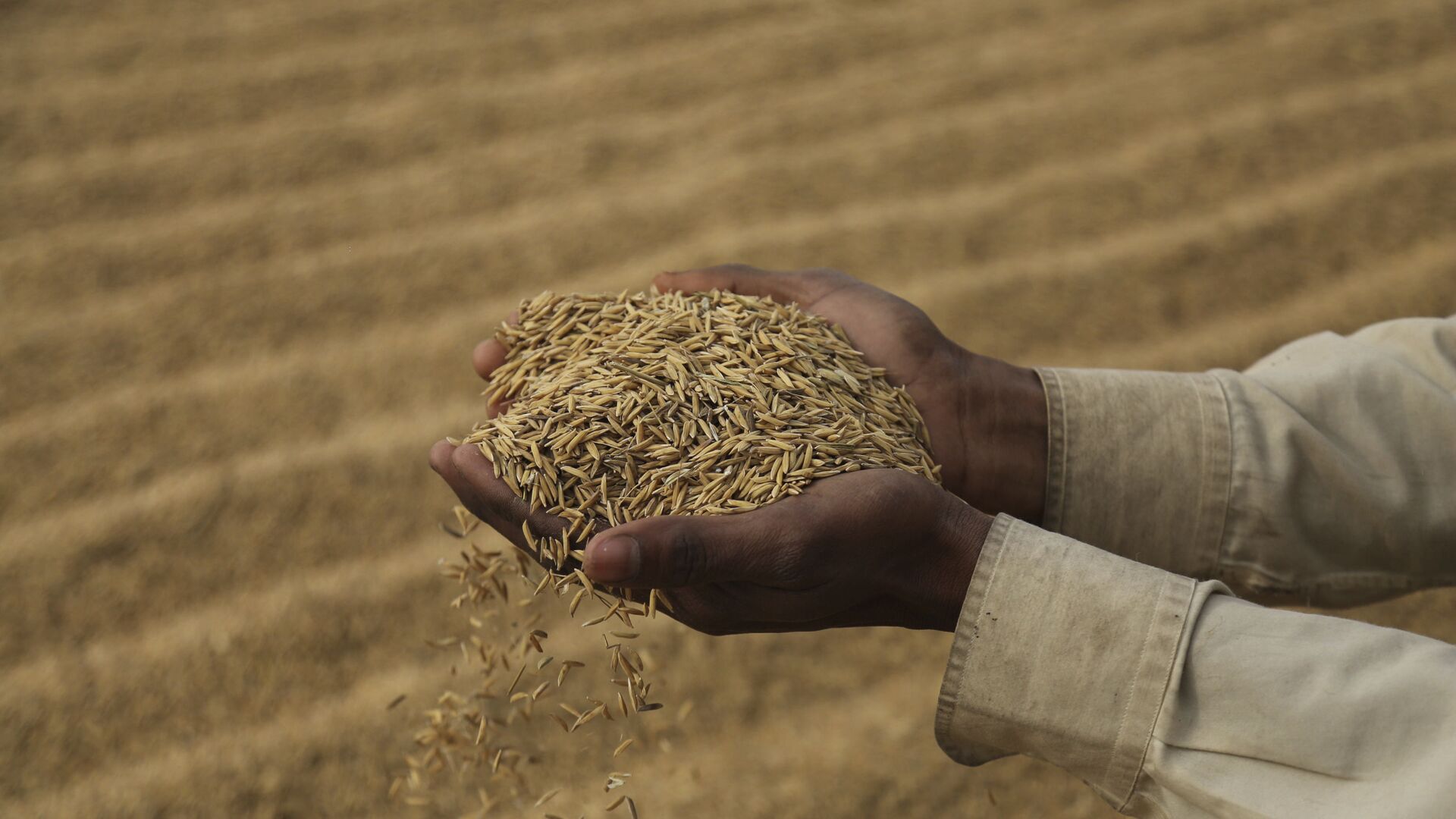https://sputniknews.in/20230926/india-allows-export-of-75000-tonnes-of-non-basmati-white-rice-to-uae-4452784.html
India Allows Export of 75,000 Tonnes of Non-Basmati White Rice to UAE
India Allows Export of 75,000 Tonnes of Non-Basmati White Rice to UAE
Sputnik India
To increase domestic supply in response to growing inflation and worries about an uncertain monsoon, India previously banned the export of non-basmati white... 26.09.2023, Sputnik India
2023-09-26T18:34+0530
2023-09-26T18:34+0530
2023-09-26T18:34+0530
world news
india
uae
bhutan
rice export ban
indonesia
singapore
nepal
chile
indian farmers
https://cdn1.img.sputniknews.in/img/07e6/0c/17/215313_0:160:3073:1888_1920x0_80_0_0_b35378b878459d4eb14b8ec578b63e6b.jpg
India has permitted the shipment of 75,000 tonnes of non-basmati white rice to the UAE. Notably, non-basmati white rice exports were forbidden beginning on 20 July to regulate domestic pricing and guarantee food security at home.The Directorate General of Foreign Trade (DGFT) said on Monday that the shipments to the UAE have been authorised through National Cooperative Shipments Limited, the Indian Media reports.One of the major importers of Indian non-basmati rice is the West African nation of Benin. The UAE, Nepal, Bangladesh, China, the Ivory Coast, Togo, Senegal, Guinea, Vietnam, Djibouti, Madagascar, Cameroon, Somalia, Malaysia, and Liberia are other destinations.India decided to permit rice exports last month to "meet the food security requirements" of Singapore.Santosh Kumar Sarangi, the director general of foreign trade, recently informed the Indian media that on 21 July, India approved the export of 14,184 tonnes of rice to Bhutan and 300,000 tonnes of wheat to Nepal.Additionally, through the National Cooperative Exports Ltd (NCEL), India is permitted to export non-basmati rice to Bhutan (79,000 tonnes), Mauritius (14,000 tonnes), and Singapore (50,000 tonnes).Export restrictions on wheat, non-basmati white rice, and broken rice were put into effect by the government in May, September, and July of the previous year, respectively, to increase domestic grain supplies.Amid rising inflation and concerns about unpredictable monsoons, India banned the export of broken rice in September 2022, and imposed a 20% levy on exports of all other types of rice, except parboiled rice. Later, in November, the prohibition was lifted.
india
uae
bhutan
indonesia
singapore
nepal
chile
Sputnik India
feedback.hindi@sputniknews.com
+74956456601
MIA „Rossiya Segodnya“
2023
Swapna Nair
https://cdn1.img.sputniknews.in/img/07e7/09/12/4320104_0:0:681:681_100x100_80_0_0_ca8a7d4d582609272840ffdd1cde7278.jpg
Swapna Nair
https://cdn1.img.sputniknews.in/img/07e7/09/12/4320104_0:0:681:681_100x100_80_0_0_ca8a7d4d582609272840ffdd1cde7278.jpg
News
en_IN
Sputnik India
feedback.hindi@sputniknews.com
+74956456601
MIA „Rossiya Segodnya“
Sputnik India
feedback.hindi@sputniknews.com
+74956456601
MIA „Rossiya Segodnya“
Swapna Nair
https://cdn1.img.sputniknews.in/img/07e7/09/12/4320104_0:0:681:681_100x100_80_0_0_ca8a7d4d582609272840ffdd1cde7278.jpg
non-basmati white rice, uae, directorate general of foreign trade, national cooperative shipments limited, west african nations, benin, uae, nepal, bangladesh, china, cote d'ivoire, togo, senegal, guinea, vietnam, djibouti, madagascar, cameroon, somalia, malaysia, and liberia, singapore, bhutan, nepal, rice import ban, export-import ban
non-basmati white rice, uae, directorate general of foreign trade, national cooperative shipments limited, west african nations, benin, uae, nepal, bangladesh, china, cote d'ivoire, togo, senegal, guinea, vietnam, djibouti, madagascar, cameroon, somalia, malaysia, and liberia, singapore, bhutan, nepal, rice import ban, export-import ban
India Allows Export of 75,000 Tonnes of Non-Basmati White Rice to UAE
To increase domestic supply in response to growing inflation and worries about an uncertain monsoon, India previously banned the export of non-basmati white rice.
India has permitted the shipment of 75,000 tonnes of
non-basmati white rice to the UAE. Notably, non-basmati white rice
exports were forbidden beginning on 20 July to regulate domestic pricing and guarantee food security at home.
The Directorate General of Foreign Trade (DGFT) said on Monday that the shipments to the UAE have been authorised through National Cooperative Shipments Limited, the Indian Media reports.
While revising the export regulations, the DGFT remained adamant that exports would only be permitted if other nations requested it to meet their demands for food security.
One of the major importers of Indian non-basmati
rice is the West African nation of Benin. The UAE, Nepal, Bangladesh, China, the Ivory Coast, Togo, Senegal, Guinea, Vietnam, Djibouti, Madagascar, Cameroon, Somalia, Malaysia, and Liberia are other destinations.
India decided to permit rice exports last month to "meet the food security requirements" of Singapore.
Santosh Kumar Sarangi, the director general of foreign trade, recently informed the Indian media that on 21 July, India approved the export of 14,184 tonnes of rice to Bhutan and 300,000 tonnes of wheat to Nepal.
Additionally, through the National Cooperative Exports Ltd (NCEL), India is permitted to export non-basmati rice to Bhutan (79,000 tonnes), Mauritius (14,000 tonnes), and Singapore (50,000 tonnes).
Moreover, the Indian government permitted the shipment of broken rice to Senegal, Gambia, Indonesia, Mali, and Bhutan, with a combined total of 100,000 tonnes.
Export restrictions on wheat, non-basmati white rice, and broken rice were put into effect by the government in May, September, and July of the previous year, respectively, to increase domestic grain supplies.
Amid rising inflation and concerns about
unpredictable monsoons, India banned the export of broken rice in September 2022, and imposed a 20% levy on exports of all other types of rice, except parboiled rice. Later, in November, the prohibition was lifted.


